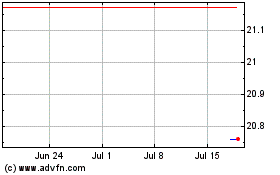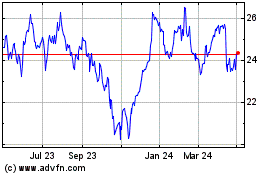MARKET MOVEMENTS:
-- Brent crude oil is up 0.6% at $80.02 a barrel.
-- European benchmark gas is up 3.4% to EUR47.35 a
megawatt-hour.
-- Gold futures are down 0.4% at $1,952.80 a troy ounce.
-- LME three-month copper futures are up 0.1% to $8,113 a metric
ton.
-- Wheat futures are down 1.3% to $5.85 a bushel.
TOP STORY:
The Electric-Car Era Needs a Lot of Really Big Trees
Electric cars. The solar build-out. Washington's rural-broadband
initiative. Utilities bracing the grid for stronger storms. They
all depend on the same thing: big trees.
The utility-pole business is booming, thanks to a flood of
public and private infrastructure spending. So the hunt is on for
the tallest, straightest, knot-free conifers, which are peeled,
dried and pressure-treated at facilities such as Koppers Holdings '
pole plant in southeastern Georgia's pinelands.
Employees cruise surrounding pine plantations, marking
pole-worthy loblolly and longleaf and making offers. The bigger,
the better these days, given how much more equipment and cable
poles must hold in the era of fiber optics and electric cars, said
Jim Healey, Koppers' vice president of utility and industrial
products.
For landowners, especially the families and individuals who grow
much of the South's pine, the pole boom means higher prices for
standout trees than what sawmills pay.
OTHER STORIES:
Agricultural Giant Syngenta Delays $9 Bln IPO Amid Chinese
Market Volatility
Agricultural company Syngenta Group said its listing on
Shanghai's main market won't happen this year due to weak market
conditions, the latest delay in its yearslong pursuit of a
blockbuster initial public offering.
The Swiss company-which was acquired by Chinese state-owned
ChemChina for $43 billion in 2017-has been working on an IPO since
2021. The company is aiming to raise 65 billion Chinese yuan ($8.93
billion), which would have made it the biggest IPO globally this
year based on Dealogic data.
--
Qatar Pursues Oil Deal After Brokering End to Venezuela
Sanctions
For more than a year, Qatar quietly hosted talks between senior
U.S. and Venezuelan officials that led to a breakthrough last month
when Washington lifted sanctions on Venezuela's crippled energy
industry.
Now the tiny Arab state, and a Qatari conglomerate, are trying
to cash in.
Days after the Oct. 17 deal to lift sanctions was struck, a
private oil company owned by a Qatari magnate, Ghanim Bin Saad,
signed a preliminary agreement to restart an oil refinery and
terminal on the Dutch Caribbean island of Curacao, just 40 miles
from Venezuela's coast, the refinery and the company said. Island
officials have long said they hope to resume its once-lucrative
role of processing and shipping Venezuelan oil to Asia and other
international markets.
--
U.K. Hits Russian Gold, Oil Sectors With New Sanctions
Package
The U.K. government has sanctioned 29 entities and individuals
operating in and supporting Russia's gold and oil sectors, in an
effort to cut off revenue streams funding its war in Ukraine.
Entities sanctioned Wednesday include Nord Gold and Highland
Gold Mining, two of the largest producers of Russian gold, and
Paloma Precious DMCC, a United Arab Emirates-based network the U.K.
said has channeled more than $300 million in gold revenue to
Russia.
The U.K. government also sanctioned a Dubai-based unit of
Geneva-based Paramount Energy & Commodities, saying the
subsidiary was used by Russia to help mitigate the impact of
oil-related sanctions against the country.
Nord Gold and Paloma Precious didn't immediately respond to a
request for comment. Highland Gold Mining couldn't be reached for
comment.
--
The $2 Million Coal Mine That Might Hold a $37 Bln Treasure
Twelve years ago, former Wall Street banker Randall Atkins
bought an old coal mine outside Sheridan, Wyo., sight unseen, for
about $2 million.
He thought the mine might eke out a profit. Instead, Atkins
recently learned it could bring a windfall.
Several years after Atkins bought the Brook Mine, government
researchers came around asking if they could run some tests to see
if the ground contained something called "rare-earth elements."
When Atkins acquired the mine, he says he "didn't know the
difference between rare earths and rare coins." When he got the
test results, including some as recently as September, he says he
was surprised and humbled: His sleepy mine contains what might be
the largest so-called unconventional rare-earth deposit in the
U.S., according to government researchers.
At current market prices, it could be worth around $37
billion.
MARKET TALKS:
Palm Oil Closes Lower on Prospect of Lower China Demand
1016 GMT - Palm oil prices closed lower on expectations of a
slowdown in demand from China and ahead of export and production
data, AmInvestment Bank's head of futures broking Low York Hong
said. China's palm oil demand is likely to cool down with the onset
of the winter season's cold temperatures, which cause thetropical
oil to solidify. Investors are waiting for October demand and
supply data from the Malaysian Palm Oil Board due on Friday, with
some expecting a 12% increase in stock levels. The Bursa Malaysia
Derivatives contract for January delivery closed MYR24 lower at
MYR3,744 a ton. (jiahui.huang@wsj.com; @ivy_jiahuihuang)
--
ArcelorMittal's 3Q Earnings Beat Consensus, But Caution
Remains
0907 GMT - ArcelorMittal's third quarter Ebitda came ahead of
consensus, but the Luxembourg-based steelmaker's cash flow missed
Barclays' estimate, analysts say in a research note. At $50
million, free cash flow missed Barclays' estimate of $206 million
and is light compared with peers, Barclays says. The company
performed better than expected in Brazil, but missed expectations
in Europe due to weak volumes, Barclays says. It adds that it
remains "cautious and think[s] it is too early to get excited at
this stage of the cycle," as European demand continues to
deteriorate. Shares trade 1.3% lower to EUR21.04.
(pierre.bertrand@wsj.com)
--
Metals Slip Amid Demand Worries
0840 GMT - Metal prices are falling as a strong dollar and weak
demand adds pressure to commodities. Three-month copper is flat at
$8,109.50 a metric ton while aluminum is 0.7% lower at $2,247.50 a
ton. Gold meanwhile is down 0.4% to $1,951 a troy ounce. The ICE
dollar index is also up 0.6% this week so far. Deutsche Bank says
in a note that investors have become increasingly concerned about
economic demand, not least after several weaker-than-expected data
releases since the start of the month. It highlights several
falling commodity prices amid the weak demand including gold, which
is now down 2.2% this month. That said, lower commodity prices are
helping to push down inflation expectations--a boost for central
bankers, it adds. (yusuf.khan@wsj.com)
--
Crude Oil Steadies After Further Losses Wednesday
0830 GMT - Crude oil prices are steadying as worries over
fundamentals overshadow the risk presented by the Israel-Hamas war.
Brent crude and WTI are up 0.7% to $80.12 a barrel and $75.85 a
barrel, respectively. Both benchmarks had losses of more than 2%
late Wednesday, with Brent closing below $80 for the first time
since July. The relative price weakness is being driven by rising
supply rather than demand weakness, UBS says. U.S. and Brazilian
production are at record highs, while Iranian production is rising,
the Swiss bank says in a note. Still, the market is likely to
remain volatile, with the market undersupplied, UBS says. It
expects prices to recover to trade in a $90 to $100 a barrel range
amid falling oil inventories. (yusuf.khan@wsj.com)
--
Arabica Coffee Prices Expected to Fall as Global Output
Recovers
0441 GMT - Global arabica coffee prices will likely trend lower
during the remainder of 2023 amid recovering production in top
grower Brazil, says BMI, a unit of Fitch Solutions. However, lower
inventories and the El Nino weather event could support prices, it
says in a note. For 2023-24, BMI expects global coffee output to
rise 2.4% to 177.4 million bags and a smaller 1.9% increase in
consumption. The coffee surplus will likely reach 5 million bags,
higher than the USDA's forecast of 4.1 million bags. "We expect
that Brazilian coffee production will increase by almost 9.5%
between 2022/23 and 2026/27, approaching 70mn bags," BMI says. "It
is our view that Vietnam will see the largest increase in annual
output over the same period...followed by Uganda and Honduras."
(nicholas.bariyo@wsj.com; @Nicholasbariyo)
Write to Barcelona Editors at barcelonaeditors@dowjones.com
(END) Dow Jones Newswires
November 09, 2023 07:33 ET (12:33 GMT)
Copyright (c) 2023 Dow Jones & Company, Inc.
ArcelorMittal (EU:MT)
Historical Stock Chart
From Oct 2024 to Nov 2024

ArcelorMittal (EU:MT)
Historical Stock Chart
From Nov 2023 to Nov 2024
